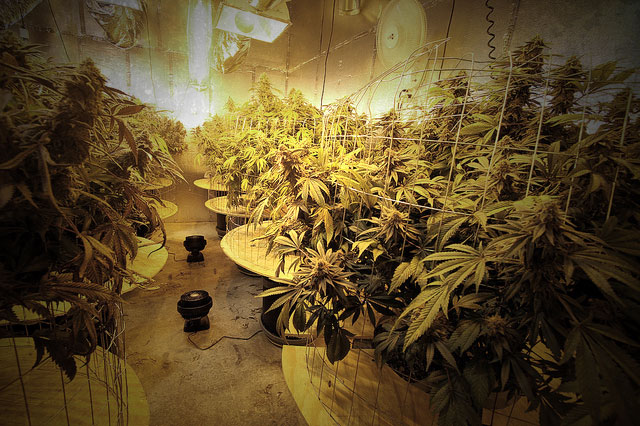
In 2014, Charlo Greene became a viral sensation as the news anchor who quit on-air after reporting on a ballot initiative to legalize recreational marijuana in Alaska.
Greene founded the Alaska Cannabis Club on April 20, 2014, after being inspired by its medicinal value. She was particularly moved by meeting a woman with a neurological disorder who had been held up at gunpoint after being forced to obtain marijuana illegally. Through the club, members who donated were provided safe access to marijuana.
Though marijuana was legalized later that year and went into effect in February 2015, opponents of legalization stalled regulations for retail operations to be implemented.
During a five-month period, undercover detectives targeted the Alaska Cannabis Club, raiding twice and making six undercover purchases. The raids produced an initial indictment listing eight offenses of “misconduct involving a controlled substance,” with another six added later on. Greene wasn’t directly involved in the undercover purchases or raids but was charged because the club is under her name. Greene, who referred to the charges as a “modern day lynching,” is now facing up to 54 years in prison. For a similar offense involving alcohol, business owners would be issued a fine or citation.
On October 5, Greene was in court again for more bad news. “I was given until November 30 to find another attorney,” Greene told Truthout. “My attorney is quitting to go to work for the state, and she let me know she wouldn’t be returning any of the funds I paid her to take my case completely to trial.”
Despite recreational marijuana use being legal in Alaska, those in power continue pushing back against rescinding prohibition, with Greene being made an example of in the continued battle for decriminalization and legalization. “It’s always been prohibitionists in power pushing back, that would like to continue using cannabis as a means of oppression in communities of color,” she said. “They’ve delayed changing any of the criminal penalties until more than a year, and now the state has publicly stated that, despite the fact there are 12 other illegal dispensaries throughout Alaska in operation, they have no intention to pursue any recourse against them, so this is solely on me.”
Communities of color have historically been targeted with marijuana charges as part of the disastrous war on drugs. A 2010 study conducted in California found that although Black and white people use marijuana at roughly equal rates, Black youth were arrested at two to four times the rates of white, with teens and young adults comprising 70 to 80 percent of all marijuana arrests. Society condones treating these youth — now burdened with a criminal record — as second-class citizens, explained Michelle Alexander, author of The New Jim Crow, in a 2014 New York Times op-ed.
“I have friends in the industry that are making millions of dollars,” said Greene. “I know people that were illegally growing acres of cannabis who walked away with nothing but probation. Fifty-four years in prison was never a threat to them. They speak about it openly.”
She cited Oregon-based marijuana advocate and activist Travis Maurer as an example of the imbalance in criminal sentences of marijuana-related charges between whites and people of color. Maurer pled guilty to a felony marijuana charge in Missouri and was put on probation after narcotic investigators stormed his home and confiscated hundreds of cannabis plants.
“It definitely has to do with the fact that he was white, because he has peers who were doing a lot less than him and they are still serving time. So race definitely has something to do it,” said Greene. “It’s important to keep in mind the root of marijuana prohibition. It was all based on racial bias, fear, hatred of the unknown, things and people they didn’t understand. So here we are, still dealing with the effects of that racial policy.”
Over the past several years, the gradual decriminalization and legalization of marijuana efforts in states, such as Colorado, have started a booming and exponentially growing cannabis market. But while communities of color have disproportionately suffered the consequences of the war on drugs, particularly through marijuana arrests, these very same communities are being left behind in this cannabis economic boom.
During a public discussion with Asha Bandele of the Drug Policy Alliance in 2014, Michelle Alexander described the situation in this way: “Here are white men poised to run big marijuana businesses, dreaming of cashing in big — big money, big businesses selling weed — after 40 years of impoverished Black kids getting prison time for selling weed, and their families and futures destroyed.”
Before facing criminal charges as founder of the Alaska Cannabis Club, Greene strongly advocated for people of color to take advantage of the opportunities provided by the end of marijuana prohibition. “We likely won’t have another opportunity like this, where just about anyone can grow this plant, figure out a decent business plan, and win because the demand is there,” she said. “The opportunities to undo some of the harm that prohibition has done to communities of color is very real, and if we don’t move quickly enough, it’s going to miss us just like every other economic boom has.”
Join us in defending the truth before it’s too late
The future of independent journalism is uncertain, and the consequences of losing it are too grave to ignore. To ensure Truthout remains safe, strong, and free, we need to raise $27,000 in the next 24 hours. Every dollar raised goes directly toward the costs of producing news you can trust.
Please give what you can — because by supporting us with a tax-deductible donation, you’re not just preserving a source of news, you’re helping to safeguard what’s left of our democracy.